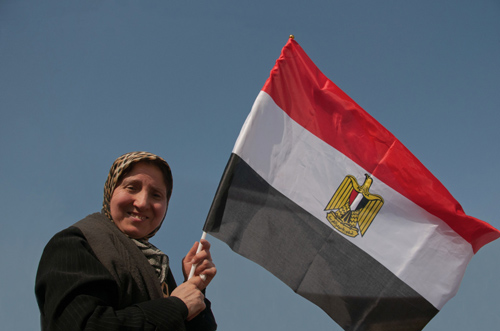
“You are not Islam! You are not Egypt! Where is my freedom?” (An Egyptian woman protesting plans to reduce the legal age of marriage to 13 as reported in The Observer, March 30, 2013)
Discussions continue over who will be Egypt’s next prime minister along with the political roadmap that will emerge with that new leadership. Can reconciliation, sustainable peace and prosperity be achieved by countries who leave half of their population out of the decision making process? Egyptian women want to be included in the process to address the political, economic and social crises facing their country. Before they can do this, they must overcome the conflicts and realities embodied by life in the context of Islam and Egypt’s ongoing Islamic rulers.
Tatiana Philiptchenko, a journalist and peace educator, works to create awareness for Egyptian women. She believes the internet has enabled them to amplify their fight for 21st century rights. In 2012 she was among the thousands of women in the Cairo Tahrir Square protest after women lost rights, including guaranteed seats in parliament. Rape and sexual harassment were on the rise. Tatiana began documenting the women’s stories and interviewed 14 activists. She also took thousands of photographs. This led to her creation of the Egyptian-women.info website followed by a French version, fr.egyptianwomen.info. Most recently, she published her powerful English language book – Fearless: Egyptian Women of the Revolution. I caught up with Tatiana to learn more about her important work on behalf of Egyptian women at a pinnacle moment in their country’s political life.
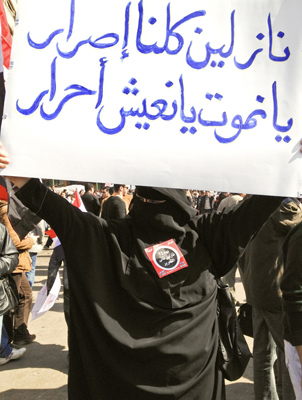
The Muslim Brotherhood objected to the UN proposal designed to reduce violence against Egyptian women. The Muslim Brotherhood is no longer in power. What will this mean for Egyptian women and the fight for their freedoms?
It is very difficult to have an answer to this question as the situation in Egypt is constantly evolving these last few days. If a new secular government is elected soon, this might give Egyptian women a bigger chance to get their voices heard but it is not a guarantee. I think it is important for any new government to take action to re-instate a fair quota of dedicated seats in parliament for women; only this would ensure they are fairly represented. In my view, having a different new power in place doesn’t automatically mean that women will suddenly be treated better and have more rights. It doesn’t mean either that sexual violence will disappear. Only local initiatives that take into account the Egyptian traditions and culture can tackle these complex issues efficiently and really solve them.
What kinds of steps do you think will be the most effective in helping to bring about gender equality in Egypt?
The gender gap in Egypt won’t be solved by the Muslim Brotherhood not being in power anymore. Let’s not forget that many, including women, supported them in the past and continue to support them now. The sidelining of women in Egypt comes from an engrained patriarchal mentality that treats women as second-class citizens. President Mubarak’s regime was secular but it did not do enough to promote women’s rights in over thirty years of power. This area has been neglected for way too long and today we see the result of this neglect. Egypt is the most populous country in the Arab world and when we talk about Egyptian women, we talk about more than forty million souls. There needs to be a concerted effort in Egypt to introduce the seeds of equality and respect for women early on in the educational system. Only this will ensure that the young generation is raised with awareness towards this issue. Otherwise, indefensible issues such as female genital mutilation and underage marriage will continue to be considered defensible by too many people and never be solved. It is not just about a single party or personality.
Today in Egypt, women and the men supporting them need to put their energy into efforts that ensure more female representatives in the Egyptian political parties and parliament so the country has a better understanding about the needs of women.
How are Egyptian women using social media to help their cause?
First of all, I would like to emphasize that there is only an inadequate percentage of women in Egypt that is using social media to fight for gender equality or other important causes online. There are still millions of girls and women that don’t have access to a computer or do not have the level of education enabling them to use these tools to advocate for their rights.
The female citizens that use social media to push for their rights are mostly those who live in urban centers and have access to a certain level of education. They use technology to exchange important information and to organize demonstrations, for example. There are hundreds of groups and pages on social networks such as Facebook dedicated to promote Egyptian women’s rights. Also, local organizations such as Harassmap, Imprint and Tahrir Bodyguard rely heavily on social media to create awareness about sexual harassment and other issues preventing the advancement of women.

You interviewed 14 women participating in the revolution. What moved or impressed you most about these interviews?
I think I was mostly impressed by the resilience of all women interviewed and how much personal suffering some endured because they decided to fight for freedom and for their rights. Women such as Samira Ibrahim, Shahira Amin, Moataza Abd Elsabour, Shymaa Adel and Nihal Saad Zaghoul all feared for their lives either in the midst of the revolution or in the two years following it. And yet they choose to continue their fight. Shahira Amin resigned from a high level position. Samira Ibrahim was ostracized by many in Egypt who thought she shouldn’t have brought to light the virginity tests she endured. Moataza was threatened in a police station and ended up having to sign a manipulated confession. Nihal was sexually attacked in Tahrir square. Shymaa Adel was detained in Sudan while covering student demonstrations there.
We talk about educating women as being a strong solution to ending gender inequality. Should we not also be educating men? What are your views on this?
Absolutely. I definitely think educating boys from an early age and bringing awareness to men is a key component to diminish the gap in gender inequality. This should be done at a local grassroots level and in a way that is always in sync with local customs and religions. Obviously, some of those local customs run counter to the message needed, so this is not easy.
Not all countries are ready for the same openness towards gender equality and certain changes can be pushed only when the society as a whole is ready for it. Ideally fathers, brothers and local leaders should be the close allies of women fighting for more equality in their societies.
What role can women around the world play to support members of their sex and help them achieve gender equality?
They can be amplifiers of the voices of the women in other countries that are fighting for their rights. They can get organized and pressure their own representatives to stop giving economic or political support to governments of countries where women’s voices are repressed.
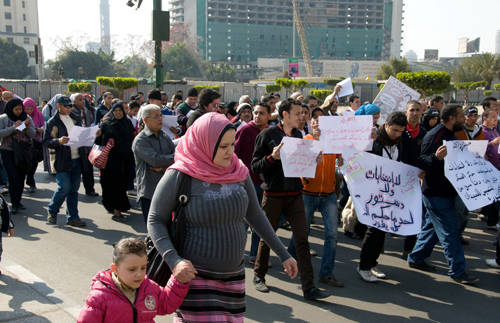
All photos are courtesy of Tatiana Philiptchenko.
For more articles in the Women series: part 1, part 2, part 3
In The Global Search for Education, join me and globally renowned thought leaders including Sir Michael Barber (UK), Dr. Michael Block (U.S.), Dr. Leon Botstein (U.S.), Professor Clay Christensen (U.S.), Dr. Linda Darling-Hammond (U.S.), Dr. Madhav Chavan (India), Professor Michael Fullan (Canada), Professor Howard Gardner (U.S.), Professor Andy Hargreaves (U.S.), Professor Yvonne Hellman (The Netherlands), Professor Kristin Helstad (Norway), Jean Hendrickson (U.S.), Professor Rose Hipkins (New Zealand), Professor Cornelia Hoogland (Canada), Honourable Jeff Johnson (Canada), Mme. Chantal Kaufmann (Belgium), Dr. Eija Kauppinen (Finland), State Secretary Tapio Kosunen (Finland), Professor Dominique Lafontaine (Belgium), Professor Hugh Lauder (UK), Professor Ben Levin (Canada), Lord Ken Macdonald (UK), Professor Barry McGaw (Australia), Shiv Nadar (India), Professor R. Natarajan (India), Dr. Pak Tee Ng (Singapore), Dr. Denise Pope (US), Sridhar Rajagopalan (India), Dr. Diane Ravitch (U.S.), Richard Wilson Riley (U.S.), Sir Ken Robinson (UK), Professor Pasi Sahlberg (Finland), Andreas Schleicher (PISA, OECD), Dr. Anthony Seldon (UK), Dr. David Shaffer (U.S.), Dr. Kirsten Sivesind (Norway), Chancellor Stephen Spahn (U.S.), Yves Theze (Lycee Francais U.S.), Professor Charles Ungerleider (Canada), Professor Tony Wagner (U.S.), Sir David Watson (UK), Professor Dylan Wiliam (UK), Dr. Mark Wormald (UK), Professor Theo Wubbels (The Netherlands), Professor Michael Young (UK), and Professor Minxuan Zhang (China) as they explore the big picture education questions that all nations face today. The Global Search for Education Community Page
C. M. Rubin is the author of two widely read online series for which she received a 2011 Upton Sinclair award, “The Global Search for Education” and “How Will We Read?” She is also the author of three bestselling books, including The Real Alice in Wonderland.


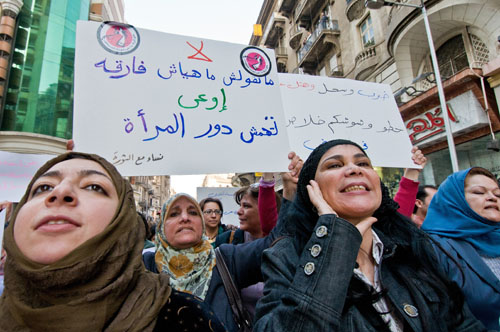
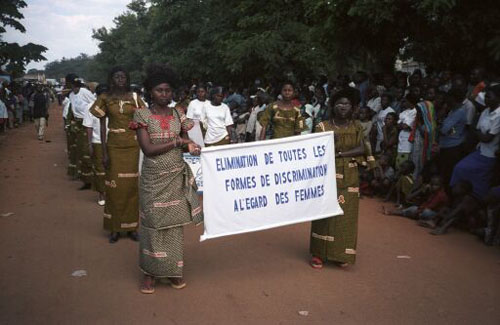
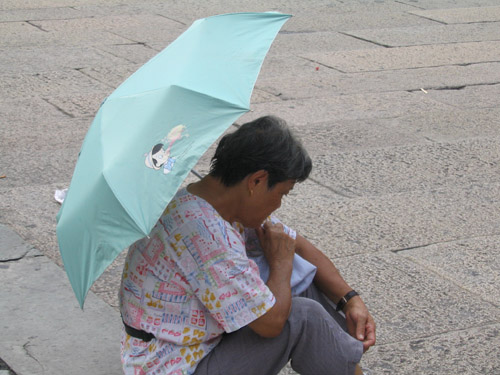
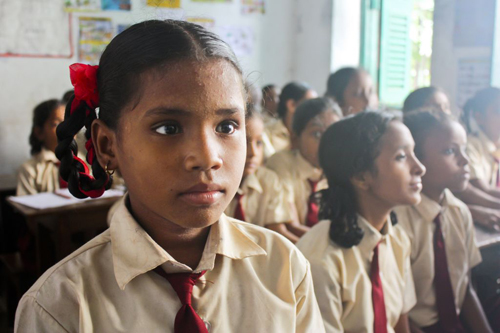
Recent Comments